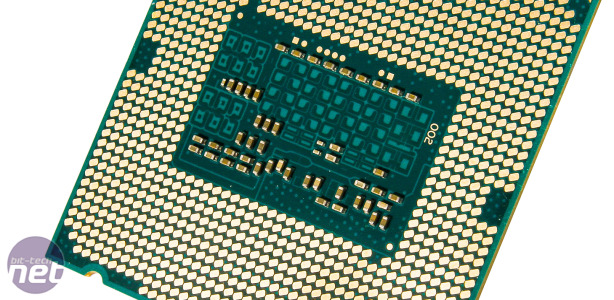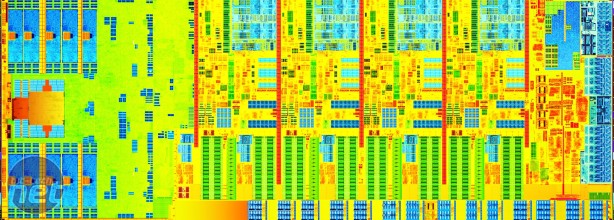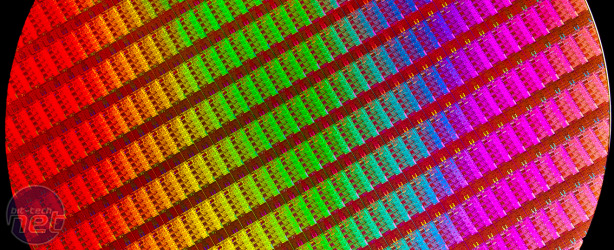Overclocking
Our experience with the Core i7-4770K resulted in a rather disappointing show when it came to overclocking, at least compared to Sandy Bridge, where 5GHz air-cooled overclocks aren't uncommon. Heat is again an issue with Haswell as it was with Ivy Bridge where we could only fire 1.256V though the CPU to crank the clock speed up to a prime95 stable 4.7GHz before the temperatures got too toasty and the CPU started throttling. This was an engineering sample, while our Core i5-4670K is a retail sample, so is likely to be more representative of what you can expect if you pick up a Haswell CPU off the shelf right now.Click to enlarge
We managed to overclock it to 4.4GHz with no voltage adjustments, just like the Core i7-4770K, and from there, it ran noticeably cooler, even with 1.3V and a clock speed of 4.7GHz. However, we just couldn't get it 100 per cent stable at this level, even with a voltage of 1.32V, where the heat then became an issue, even for our Corsair H100i. Knocking it back to 4.6GHz solved the issue and we were also able to reduce the voltage back down to 1.26V too, with anything lower resulting in errors in our video encoding test. As with the Core i7-4770K, we didn't bother tweaking the baseclock as we found the limits all too quickly just using the multiplier. If you're feeling brave enough to void your warranty, though, our recent look at de-lidding Ivy Bridge CPUs showed there's plenty of thermal performance to be gained going that route, and it's the same for Haswell too.
Performance Analysis
At stock speed, the Core i5-4670K was mightily impressive in our GIMP-based image editing test, where only the Core i7-4700K was faster. It beat the Core i7-3770K by a noticeable margin and was 105 points faster than the Core i5-3570K too. Our Handbrake video encoding test showed a similar story, with the equivalent Ivy Bridge CPU proving to be a little slower, although hyper-threading meant all the Core i7 CPUs from the Core i7-2600K upwards were still faster.
Our multi-tasking test still suffered from slower than expected results for both Haswell CPUs, despite trying them in several different motherboards, with only the Asus Maximus VI Extreme able to return results that were significantly better. This meant that overall, the Core i5-4670K wasn't a great deal faster at stock speed than the Core i5-3570K in our media benchmarks.
Click to enlarge
In our game tests, there were small differences again, with a 10 per cent lead over the Core i5-3570K in the Shogun 2 CPU test, but little improvement in the Elder Scrolls: Skyrim test. Finally, Cinebench R11.5 showed a small improvement over the Core i5-3570K, with a score of 6.41 as opposed to 6.32, but as in all our tests, the difference between the Haswell CPU and older Core i5-2500K was much more impressive.
Our 4.6GHz overclock is a couple of hundred megahertz slower than that we achieved with both Ivy Bridge and Sandy Bridge CPUs, but in our image editing test the Core i5-4670K still posted the second fastest score despite this disadvantage. However, our video encoding test, which loves raw power wasn't as kind, and the result here was noticeably slower than the 5GHz Core i5-3570K, although still faster than the 5GHz Core i5-2500K, with the Sandy Bridge CPU finally showing its age a little. The same was true overall - the Core i5-4670K was faster than Core i5-2500K despite a 400MHz overclock disadvantage, but slower than the Core i5-3570K, which was also running at 5GHz.
The 1,200MHz overclock also saw a marked improvement in our game benchmarks, with the minimum frame rate in both the Elder Scrolls: Skyrim and Shogun 2 boosted by over 10 per cent. The Cinebench score also sky-rocketed from 6.41 to 8.39. Power consumption was in line with what we saw with the Core i7-4770K - very low idle power consumption, but rising to slightly more than we saw with Ivy Bridge when under load, but only by a couple of watts.
Click to enlarge
Conclusion
The situation with the Core i5-4670K is much the same as it is with the Core i7-4700K. Overall it's noticeably faster than its predecessor, the Core i5-3570K in most of our tests, particularly so at image editing. However, the difference isn't as significant as we'd hoped. It's certainly not worth upgrading if you own a K-series Ivy Bridge CPU and only the result in our image editing test would possibly warrant an upgrade from a Core i5-2500K. Even here you're talking about a 13 per cent improvement, which is significantly less than you would have seen going from a Core i7-920 or Core i5-750 to a Core i5-2500K.
The issue with heat and overclocking is certainly a worry, but only really to those that planned on whacking the clock speed up to 4.8GHz like you could with Sandy Bridge or Ivy Bridge. At 4.6GHz, it kept pace in many of our tests with previous generation CPUs that were overclocked much higher anyway. As such, the argument that you should buy an Ivy Bridge CPU instead doesn't really hold up in the overall scheme of things; even if you find a Core i5-3570K in a flash sale, LGA1155 is now end of life so makes for a pretty poor purchase if you're an upgrade fanatic. In addition, even if you only overclock the Core i5-4670K to 4.4 or 4.5GHz, it's likely to be as fast as previous generation CPUs clocked 200-300MHz faster. And again, if you're willing to de-lid the chip, there's room to stretch this CPU further.
The Core i5-4670K might not offer the same wow-factor as Sandy Bridge did when it hit the shelves in early 2011, but it's without doubt the CPU you should be considering if you're buying a new system, or upgrading from a pre-Sandy Bridge one with a budget of less than £200.

-
Speed43 / 50
-
Features14 / 15
-
Value30 / 35


MSI MPG Velox 100R Chassis Review
October 14 2021 | 15:04












Want to comment? Please log in.